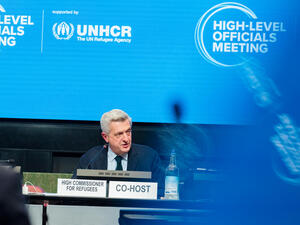Hopes of moving to Canada spark changes in Bangladeshi camps
Hopes of moving to Canada spark changes in Bangladeshi camps

Neer Hasim, accompanied by his family, walks through Nayapara Refugee Camp. They are looking forward to the education opportunities in their new home, Canada.
NAYAPARA REFUGEE CAMP, Bangladesh, March 27 (UNHCR) - The 16,000 refugees in this camp may have only the vaguest idea where Canada is, but they know one thing - they want to live there.
Neer Hasim, a 33-year-old father of four daughters, has been boning up on the faraway northern country because he and his family are among the 22 lucky Myanmar refugees in two miserable camps in Bangladesh who have actually been chosen for resettlement to Canada.
"It's the difference between the sky and the ground," he said, illustrating his point with dramatic hand gestures. In Nayapara Refugee Camp, "we always carry anxiety with us. Living conditions, food, freedom of movement are very limited. In Canada my whole life will change, and I can enjoy life much more."
Last year, Canada accepted 23 Muslim Rohingya refugees from Myanmar for resettlement; 13 of them left Bangladesh last December for Kitchener, Ontario. Another nine, accepted under the 2006 quota, are scheduled to leave the camps in Bangladesh soon. One baby girl, accepted with her family, tragically drowned in a domestic accident before she could leave the camp.
"This was a humanitarian gesture by Canada while we seek durable solutions for more than 26,000 Rohingyas in the two camps in Cox's Bazar - Nayapara and Kutupalong," said UNHCR's representative in Bangladesh, Pia Prytz Phiri. "We welcome any efforts that could herald some movement on ending one of our most protracted refugee situations in Asia," she added.
The Rohingyas are a minority Muslim ethnic group from northern Rakhine state who are denied citizenship within their own country. The refugees in the camps in Cox's Bazar have been languishing in sub-standard conditions since fleeing persecution by the military junta in Myanmar in 1991, with no realistic prospects of going home soon.
The 22 are seen as test cases. "They're like ambassadors in Canada," said one UNHCR staffer. "If they integrate well, Canada may take more."
That hope alone is prompting dramatic changes in the camps, as refugees try to tailor themselves into people they think Canada would want.
"The whole situation in the camps has completely changed," said Tun Nyo, UNHCR community services assistant, who visits the camps daily. She said refugees "started to learn English, even the adults started going to school. Domestic violence has been reduced, as have early marriages." Refugee leaders said they have begun to discourage polygamy as well.
"We all started to hope one day we can go to Canada," agreed an 18-year-old youth leader in Kutupalong Camp, who asked that his name not be used. "Before the resettlement programme, our parents didn't encourage education for their children. Now they encourage it very much because they understand that without education, skills and English language, the third country will never select us for resettlement."
Added a 20-year-old refugee named Mohammad: "If you see old people, now everybody has a book in his hand." One 52-year-old man is even learning his ABCs in the evening from his six-year-old son, who is a first-grader in Kutupalong's informal school.
Education is top of the list of priorities for Neer Hasim, who mourned that - as a member of a persecuted minority - he never got the chance to attend high school or go to university in Myanmar. Although he wants to work to support his family in Canada, he also hopes for a second chance at university.
He's particularly excited that his oldest girl, Shampa, 11, just finishing the last grade available in the camp school, will get a chance to go further in Canada. Even Hasim's shy wife, Rafik Hatun, 29, vowed to go to school for the first time. "I'm very excited," she said, "I want to study and learn English."
Over in Kutupalong Camp, Ayesha Khatun, 64, who's soon to depart with her only unmarried son, 25-year-old Shamsul Alam Shah, said people have told her "Canada is a nice country, a developed country, both cold and hot," unlike Bangladesh, where it is mostly hot and hotter.
Undaunted by the prospect of learning English, she said cheerfully, "I don't think it will be difficult." Then she paused and added: "It will be easier than life in a refugee camp."
By Kitty McKinsey in Nayapara Camp, Bangladesh









